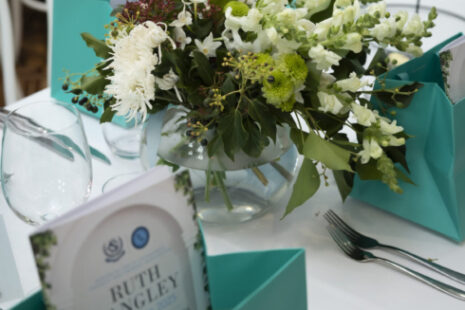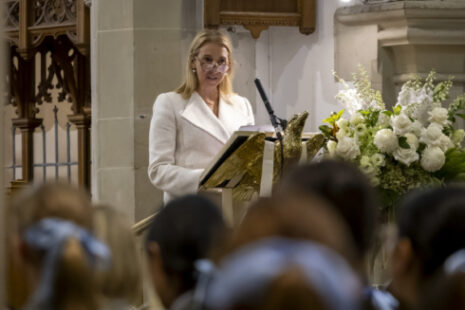Encourage Your Daughter to Step Outside Her Comfort Zone

“Promise me you’ll always remember: You’re braver than you believe, stronger than you seem, and smarter than you think.” – A.A. Milne
“Promise me you’ll always remember: You’re braver than you believe, stronger than you seem, and smarter than you think.” – A.A. Milne
A.A. Milne’s famous quote, spoken by fictional character Christopher Robin to Winnie the Pooh, urges young children to step forward into new surrounds with confidence and a self-awareness of their inner strength, intelligence and resourcefulness. The commencement of a new school year is a timely reminder for parents to encourage all children and teenagers to believe in their abilities and to step outside their comfort zone. This can be related to settling into a new school, a new subject or simply new learning.
Learning itself is a hugely joyful and fulfilling experience, stimulating curiosity and new connections; yet to learn, students need to explore and venture out into the unknown. Whilst unique for every individual, growth is, however, uncomfortable, so if we want girls to achieve growth, we need them to get comfortable with feeling uncomfortable.
Over the course of the first two weeks of the new school year, I have enjoyed conversations with parents proudly describing their daughter’s willingness to step forward from their comfort zone through trialling for GSV Sport as a Year 7 student, joining the Senior Debating Team as a Year 9 student, living away from home as a new boarder, speaking for the first time at a Barbreck Assembly and starting school for the first time as a young ‘Preppie’ in Barbreck.
This same courageous approach needs to also apply to their academic endeavours. Persisting with the demands of new subject content, skills and required knowledge, not fearing the looming first SAC and enacting the advice the Lord Mayor of Melbourne, Ms Sally Capp, shared with our Year 12 students at their Leadership Conference:
“As young women, they are encouraged to develop confidence and skills to articulate their needs.” This year, each girl is encouraged to enter a partnership of learning with their teacher. This partnership must embrace a clear communication channel directly with teachers to enable greater clarity when they need to understand difficult content matter, and to confidently seek further feedback about specific areas of work that might need improvement.
Vital conversations at home need to encourage a level of persistence and resilience with academic learning, and embracing an understanding that for exceptional learning to occur, and be sustained, students need to engage in their learning and to make an effort, even when they find it hard to do so. Developing the academic resilience to persevere when things are not easy is also essential. It is important students understand that learning involves getting things wrong and can often require struggle. The experience of failing or finding something difficult actually allows girls to progress with their learning.
To assist with such conversations, I encourage parents to utilise the graph above with their daughters who are experiencing a reluctance to step forward from their comfort zone. In this case, her language may reflect a lack of self-confidence, finding excuses, dispensing blame to others and a heightened impact of being affected by the opinions of others.
At some point in our lives we do everything for the first time, and accepting there are going to be challenges, and at times failure, all comes with stepping out of the comfort zone in any area of life.
Equating academic learning with ‘fitness’ conjures up notions of training and practice, and is a powerful way to emphasise the control girls can have over their learning. I first encountered the term ‘academic fitness’ in the work of Professor Andrew Martin from The University of Sydney. Essentially it refers to a student’s ‘readiness and preparedness’ for good learning and works effectively to empower students with their learning. Professor Martin identifies through his research that, “Girls tend not to have a strong sense of control over their academic life. We find they do not always feel they are in the driver’s seat and they are uncertain about their ability to avoid poor performance and failure.”
‘Academic fitness’ is something many girls who train for a sport or learn a musical instrument can relate to, and has the potential to motivate students to refine their approach to learning and build more productive study behaviours.
The study of neuroscience has provided an understanding of the plasticity of the human brain. That is, its capacity to change in response to circumstances. Simply put, science tells us that if we do something repeatedly, the part of our brain we are using grows new connections and becomes stronger. Giving this information to our students is important as it reinforces their own role in their learning success, acting as a motivating force and cementing girls’ beliefs that they are able to learn and make meaningful academic progress with effort, attitude and strategy.
By drawing students’ attention to areas where they can have an impact, and effectively a greater sense of control, we are essentially promoting their academic fitness. Martin refers to the importance of reminding girls of three areas where they do have control over their learning:
Attitude: What girls think about themselves and the tasks they have to do, their beliefs about their capacity to learn.
Effort: How hard they try.
Strategy: The way they try and the way they do their work.
Discussions which carefully guide girls through each of the ‘Zones of Learning’ will strengthen their understanding of what they may be experiencing or feeling in each phase. Understanding this process will inevitably enable the ‘Growth Zone’ to be a focus and goal. Our Head of Junior School, Ms Karen McArdle, and our Heads of Faculty in the Senior School can provide further support and guidance of the specific learning needs of the curriculum areas.
Forthcoming Events
Friday 22 February at 9.30am
Parents are invited to attend our special Senior School Assembly next Friday, commencing at 9.30am. The Honourable Julie Bishop MP will deliver an address to our Senior School students about her life in politics and her leadership journey.
Tuesday 26 February at 10.30am (please be seated by 10.00am)
Current and past Barbreck parents are invited to attend the Official Opening of the Junior School – Barbreck by The Honourable Linda Dessau AC, the Governor of Victoria. To ensure adequate seating, parents are reminded that an RSVP to this event is essential.






